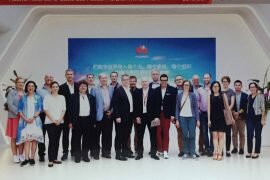To jointly elaborate on how to make China’s cities cycling-ready, the GIZ “Mobility and Fuels Strategy as a Contribution to the Transport Transition in China”(MFS) project together with the GIZ “Sino-German Cooperation on Low Carbon Transport” (CLCT) project, the GIZ “Sino-German Urbanisation Partnership” project (SGUP), the Ministry of Transport (MoT), the China Academy of Transportation Sciences (CATS) and SinoCarbon Innovation & Investment Co.,Ltd., jointly organized a cycling workshop on April 12, 2018 in Beijing.
The aim of this workshop was to elaborate on challenges and opportunities of cycling in the urban context, related policies and best practices in China and Germany. Besides the organizers, various representatives of provincial transport planning institutes and cycling experts from Germany attended the workshop.

After a welcoming by Mr. Wang Guangmin, Head of the Environmental Protection Division of the MoT, Ms. Sandra Retzer, Head of the cluster Urbanisation, Transport and Energy of GIZ China, introduced the role of cycling in urban context and its importance for low carbon transport.
Ms. Retzer stated that cycling is an alternative to the car, not only practicable and healthy, but also bears the potential to reduce congestion, GHG emissions, noise and local air pollution in particular in urban environments. In addition, cycling improves the city`s image and fosters local economies and tourism. While cycling itself is certainly not new to China, formerly known as “Kingdom of Bicycles”, integrating it successfully into the public transportation system is challenging. Increasing urban “bikability”, however, requires appropriate cycling infrastructure and related service facilities but also integrated and sound policies.
Following on the introduction, the participants presented a series of insightful presentations, shedding light on recent developments and achievements in the promotion of cycling in both China and Germany.
Dr. Liu Fang, Deputy Researcher at the CATS presented the status quo of cycling development in China and stated that non-motorized transport and in particular cycling has high priority on the agenda to achieve more sustainable urban transportation systems. But there are also significant challenges on the way towards a revival of the Kingdom of bicycle.
Some of the current challenges are:
- Lack of current overall regulatory and management system
- Lack of sufficient funding schemes
- Insufficient infrastructure planning
- Lack of road safety
- Lack of standards
Dr. Liu highlighted a new cycling highway in Beijing as best practice. The 6.3 km long elevated bike path, which will connect Huilongguang and the tech area Shangdi in the north of Beijing, will predominantly serve daily commuters and thus contribute to the reduction of congestion, GHG, noise and local air pollutant emissions. The cycling highway will be ready by end of this year.
Following on the input of Dr. Liu, Mr. Jan Rickmeyer of GIZ and Mr. Uwe Petry, Director of VAR+, a cycling infrastructure planning bureau in Germany, presented best practices from Germany, introducing the German 2020 National Cycling Plan and the city of Leipzig`s cycling strategy. Leipzig introduced effective policies and a successful promotion of cycling which led to a positive change, making Leipzig a cycling city and thus more livable and eco-friendly.
Further inputs came from distinguished Chinese experts. Mr. Xiaolin He, Director of the Chun'an Transport Bureau and Dr. Runfei Deng, Deputy Chief Planner at the China Design Group Co.,Ltd. Mr. He presented the cycling greenway Chun'an, a tourism cycling project at the Qiandao Lake in Zhejiang Province, which is successfully implemented and can be considered as a cycling lighthouse project in China. He mentioned that currently cycling infrastructure in China is often a driver to foster tourism and characterized as “eco-roads” (生态路), i.e. cycling pathways around landscape scenes, lakes or green corridors.
Mr. Deng introduced the geographic and landscape conditions around Huantai Lake in Shandong province and presented the Huantai Greenway, China’s first province-crossing cycling highway with a total length of 316.6 km as another best practice project for cycling tourism.
A last input was given by Mrs. Ye Rushi, Director at Chinese bike sharing company Mobike. She explained that Mobike considers itself as a stakeholder in urban planning and with its GPS based smart lock is able to track and visualize Mobikers’ travel behavior. This enables Mobike to gain valuable information such as average travel distances or urban “cycling hot spots”. This and other information can be used in urban-, land use- and transport planning but also contribute to an optimized redistribution of the bicycles. In cooperation with Tsinghua University, Mobike is conducting data analysis, aiming on a better understanding of the relation between bike-sharing and public transport systems.
During the follow-up discussion, the participants exchanged ideas on how to increase the role of the bicycle within the transportation system and how to effectively regulate free floating bike-sharing. Sound policies, guiding frameworks, financing mechanisms and integrated planning are needed.
Closing the workshop, Mr. Wang Guangmin stated that a close cooperation between China and Germany on the topic of cycling would contribute to a more sustainable development of China`s transport sector and that concrete cooperation steps should be elaborated soon.





Comments are closed.